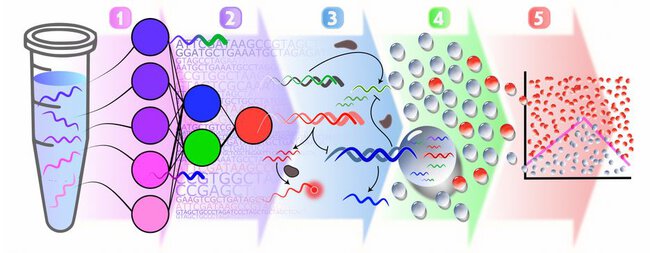 >Artificial neural networks have revolutionized electronic computing. Similarly, molecular networks with neuromorphic architectures may enable molecular decision-making on a level comparable to gene regulatory networks1,2. Non-enzymatic networks could in principle support neuromorphic architectures, and seminal proofs-of-principle have been reported3,4. However, leakages (that is, the unwanted release of species), as well as issues with sensitivity, speed, preparation and the lack of strong nonlinear responses, make the composition of layers delicate, and molecular classifications equivalent to a multilayer neural network remain elusive (for example, the partitioning of a concentration space into regions that cannot be linearly separated). Here we introduce DNA-encoded enzymatic neurons with tuneable weights and biases, and which are assembled in multilayer architectures to classify nonlinearly separable regions. We first leverage the sharp decision margin of a neuron to compute various majority functions on 10 bits. We then compose neurons into a two-layer network and synthetize a parametric family of rectangular functions on a microRNA input. Finally, we connect neural and logical computations into a hybrid circuit that recursively partitions a concentration plane according to a decision tree in cell-sized droplets. This computational power and extreme miniaturization open avenues to query and manage molecular systems with complex contents, such as liquid biopsies or DNA databases.
>Artificial neural networks have revolutionized electronic computing. Similarly, molecular networks with neuromorphic architectures may enable molecular decision-making on a level comparable to gene regulatory networks1,2. Non-enzymatic networks could in principle support neuromorphic architectures, and seminal proofs-of-principle have been reported3,4. However, leakages (that is, the unwanted release of species), as well as issues with sensitivity, speed, preparation and the lack of strong nonlinear responses, make the composition of layers delicate, and molecular classifications equivalent to a multilayer neural network remain elusive (for example, the partitioning of a concentration space into regions that cannot be linearly separated). Here we introduce DNA-encoded enzymatic neurons with tuneable weights and biases, and which are assembled in multilayer architectures to classify nonlinearly separable regions. We first leverage the sharp decision margin of a neuron to compute various majority functions on 10 bits. We then compose neurons into a two-layer network and synthetize a parametric family of rectangular functions on a microRNA input. Finally, we connect neural and logical computations into a hybrid circuit that recursively partitions a concentration plane according to a decision tree in cell-sized droplets. This computational power and extreme miniaturization open avenues to query and manage molecular systems with complex contents, such as liquid biopsies or DNA databases.
Nature
Volume 610, pages 496–501 (2022)
Published: October 2022
By: S. Okumura, G. Gines, N. Lobato-Dauzier, A. Baccouche, R. Deteix, T. Fujii, Y. Rondelez & A. J. Genot
DOI:10.1038/s41586-022-05218-7

